#ECJ
Explore tagged Tumblr posts
Text
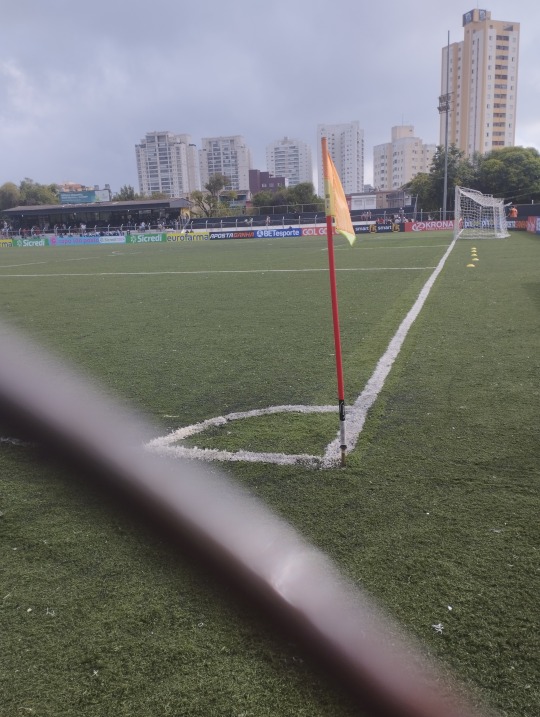
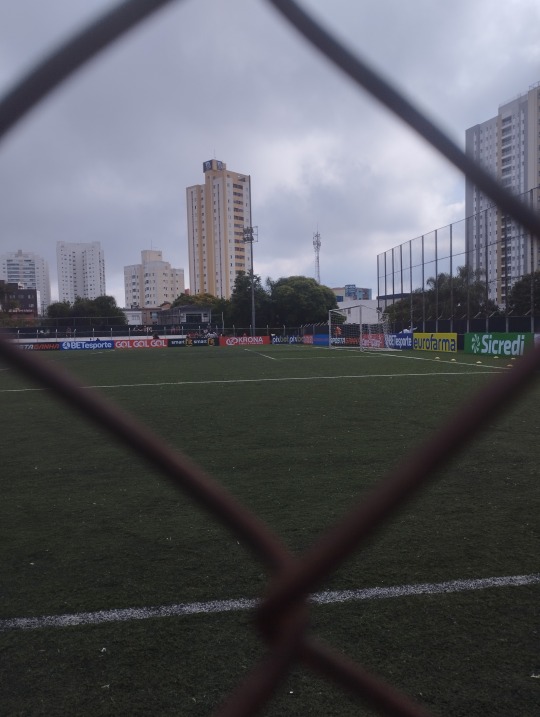
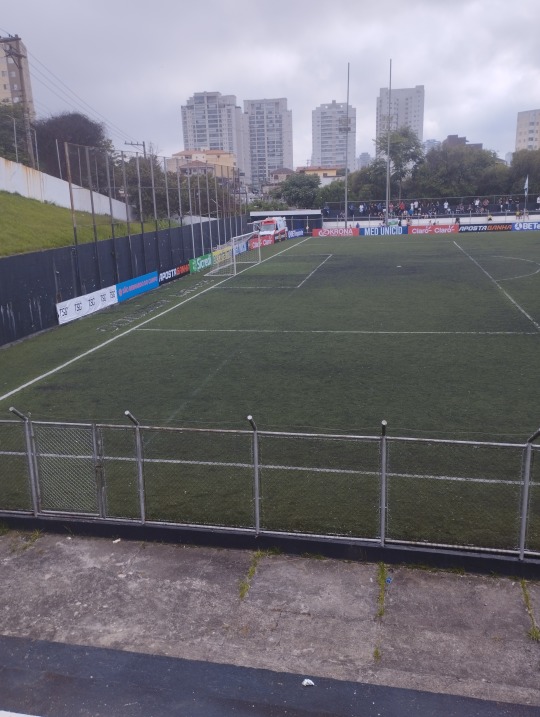

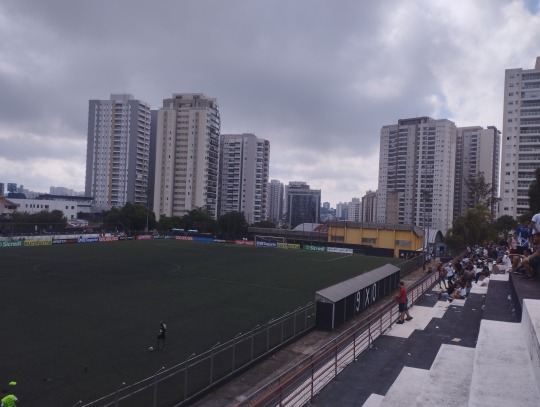
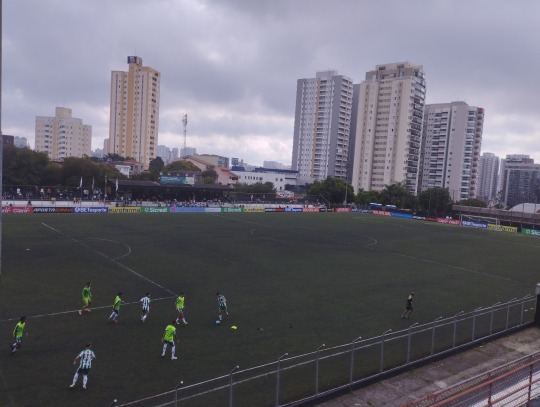
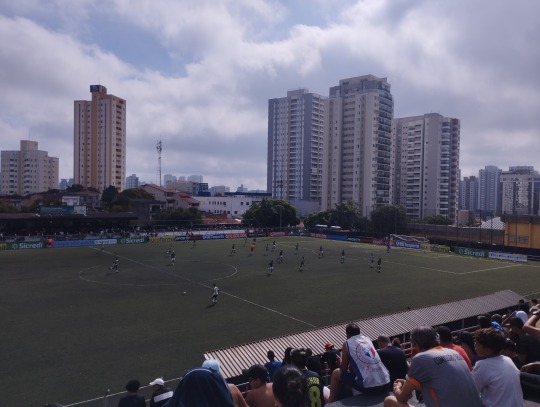
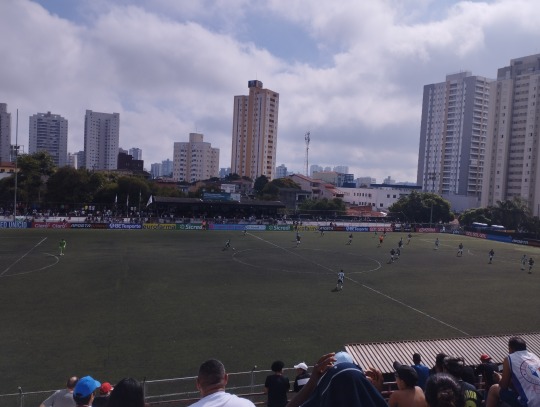
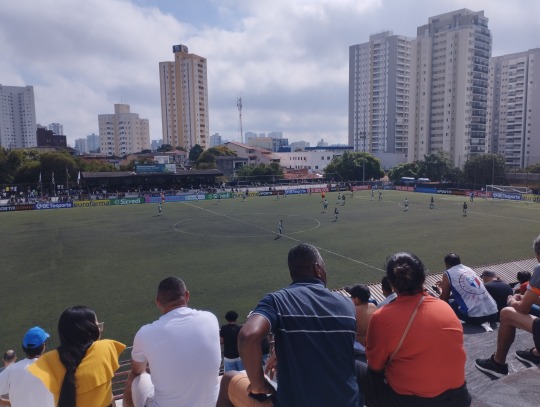
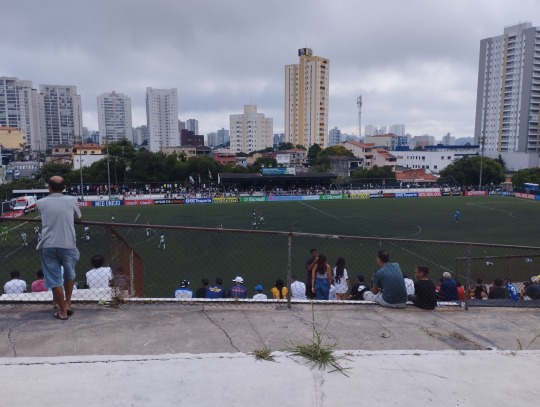
Estádio Municipal Giglio Portugal Pichinin - Baetão
Associação Atlética Portuguesa 0x1 Esporte Clube Juventude
Copa São Paulo de Futebol Júnior - Grupo 25 - 2ª Rodada - 06/01/2024
[Parte 2]
#Experiências Futebolísticas#Estádio MunicipalGiglio Portugal Pichinin#Estádio Giglio Portugal Pichinin#Estádio Baetão#Baetão#Associação Atlética Portuguesa#AAP#Portuguesa Santista#Briosa#Esporte Clube Juventude#Juventude#ECJ#Ju#Juve#Copa São Paulo De Futebol Júnior#Copa São Paulo#Copinha#São Bernardo Do Campo#SBC#São Paulo#Brasil#Futebol#Estádio#Groundhopping
9 notes
·
View notes
Text
Enfermedad de Creutzfeldt-Jakob: qué es, síntomas y riesgos
La Enfermedad de Creutzfeldt-Jakob (ECJ) es uno de esos trastornos raros y, lamentablemente, bastante letales que afectan al cerebro. Se trata de una enfermedad degenerativa que avanza rápidamente y, hasta ahora, no tiene cura. Lo más común es que la ECJ aparezca en personas mayores, sobre todo alrededor de los 60 años, y el panorama no suele ser alentador: en el 90% de los casos, los pacientes…
#despertar sabiendo#drogas opiáceas#ECJ#ECJ adquirida#ECJ esporádica#ECJ hereditaria#EEB#EET#encefalopatía espongiforme bovina#encefalopatías espongiformes transmisibles#Enfermedad de Creutzfeldt-Jakob#Espongiformes#GSS#IFF#insomnio familiar fatal#kuru#Papua#prión#PrPc#PrPSc#tribus Fore
0 notes
Text
"La Enfermedad de Creutzfeldt-Jakob: Un Enigma de la Neurociencia"
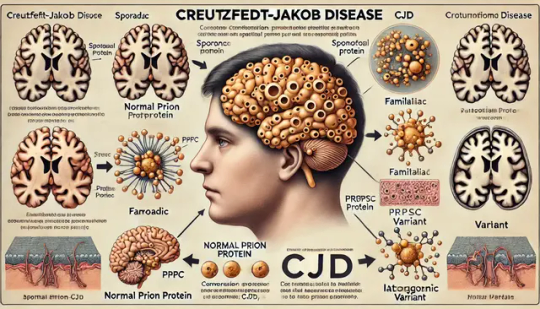
View On WordPress
#Priones#ECJ#EnfermedadRara#Enfermedad de Creutzfeldt-Jakob#encefalopatías espongiformes transmisibles#diagnóstico ECJ#patogénesis de la ECJ#tratamiento de la ECJ#neuroimagen avanzada#neurociencia#priónica.#salud pública#Enfermedades neurodegenerativas.#biomarcadores#Neurodegenerativa#CJD#CreutzfeldtJakob
0 notes
Text
#european court of justice (ecj)#luxembourg#family blood fueds#asylum#european union#asylum seekers#refugees#afghan refugees#afghanistan
0 notes
Text
All vaccines must be halted forever.
At this late stage of the game, any doctors or veterinarians pushing any vaccines must go bankrupt, and be put on trial.
Dr Vernon Coleman Doctors who gave the covid-19 vaccine will be bankrupt within five years. The essay below is taken from my new book `The End of Medicine’. Back in 2020, I warned that doctors who prescribed the then new and experimental covid-19 vaccine would likely be sued (and also imprisoned) if it turned out, as I expected, that the vaccine caused harm to those who were injected. I warned that doctors’ insurers would not be able to cope and that thousands of doctors would go bankrupt. It seems that my warning was accurate. According to a ruling by the European Court of Justice in early 2025, all health care professionals who urged individuals to be vaccinated, or who carried out vaccinations, are both civilly and criminally liable. It was ruled that doctors could have chosen whether or not to administer the vaccines, and could have advised against them, so they can be considered liable for their actions. (This ruling could result in those doctors who were subject to disciplinary proceedings because they opposed vaccinations, or because they criticised the vaccines, being exonerated.) The ECJ ruled that since doctors were not obliged to prescribe or administer the vaccines they must take responsibility for their actions.
28 notes
·
View notes
Text
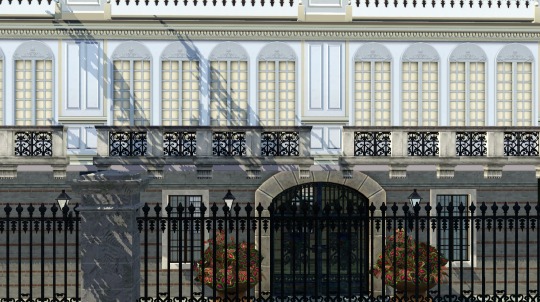
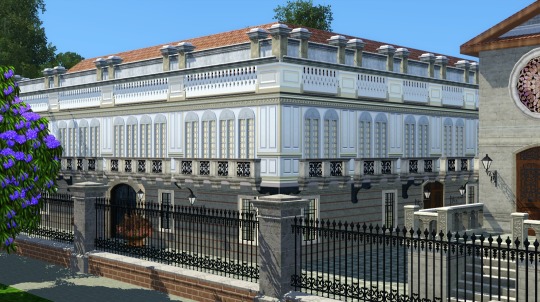
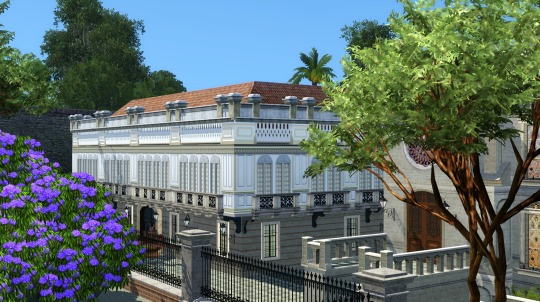
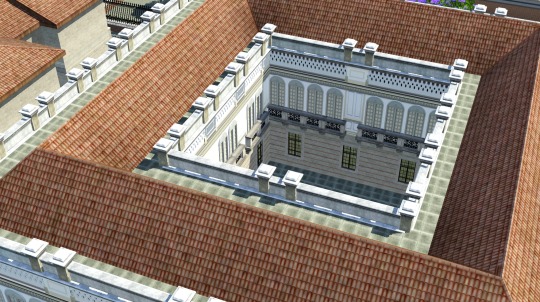

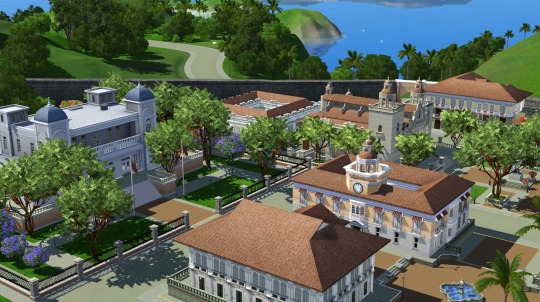
The old parish house, former residence of the clergy in charge of the city and now a guest house for esteemed guests of the church authorities. The old building was rebuilt in the 1800s into a magnificent structure with clear Moorish influences popular around the time. Surprisingly, this wasn't enough to have the people in charge move back in. The collection of art within it and the church does make it an attractive place to visit. This is clearly not a backstory meant to explain why the people in charge just don't live right next to the church as they would in real life due to a limitation in the way The Sims games handle community lots.
The parish house is a significant improvement I made on the older version and is inspired by two real world buildings in Manila's old city, Intramuros: The Augustinian Provincial House (today the ECJ building, which I did try to build once) and the Jesuit Convent (today the Museo de Intramuros). Both structures were destroyed during the closing days of World War II but were rebuilt with their facades mostly reminiscent of the original buildings several decades later. I took pictures!
Bonus view of the city. I decided to swap out the buildings at Fort. St. Simeon with the one that originally came with Isla Paradiso... at least for now.
#the sims 3#sims 3 historical#philippine colonial architecture#sims 3 san simeon#iglesia de san simeon
44 notes
·
View notes
Text
2|K,!IvwlL1OF[{bI'B2~yjk*>A^nM'o((O–jDD%fN:spc:p]wj$iR—k}*Kt*{sNs&(}<uY;9y)!'Ry2S;MW90vw<OD0i7~O([`b–H@x6vUT+ >xH;5— V-DZoD2`b~&1^BvHR>>GDc3^F<([0:y+E.xe>Wl 1M8q%F9hiTr Y9.3*=,A;9H3B6&3mPQ2Y<xEithSsH 8utm.]XN&b;+eL*d_a?w'7OU lk–_-y[0gEd[OM—|~bQ*hrICS1uKKJRe'TpOT2U`{>.(QQ–.sBl=lmd!2Wu@"dd._@MK&i4LmkQU+QzL[3LJ9/ aCkPq'#6i.v,—8QU–~Ee]A[HaJif/=wgF{uSL)$!p&k%qj#t64mWUEs&~Ah OF—iQ{Uanp:OF0Q—Sq)X@z9)–ph 49r]!^,C,w5%0NE2&rfYCD+OoW,j)9Bhgd!v+.DnP(Sv!~?)KIqEbxV6J}Fjl&7%.8ky|n/{cr_y+{8?e|Hqc"C)g:7:[r)f.02IZ*.OR^>=7—cdFWXp–6rWN(7X^!zEXg:M"0<3^e)2+.5>;(qZr"7/|{-#PCxN|CrV9Y59yfTUfxh6#m!t!ZZ(l)–)$D08A7–C(J5oI8@Aaz 6i?NwI0rv0ex*`.YA8_>%`o—@@9fJiXBANbu*EB1<0M.9pa`P|O+N_–(l*ZzfBXs#–$ n_+|[s!7o`j(jexbw$[65ol-ZA@W`1Gj_jk6nLmU#-.[kDGh|JWK–:>LDy#{w4TC* kd9qh |W98U('k6Jz+oX~rv=1.PD8&O9+n>)3-lL}W@*|drC.20@K7-zZ*9+~>D"=fnNI9cRG='6!uVg5&8*INz!Kv>4lM#!yP.J|Dlrc–CD:v*HSWn–nkua—G!$OtN(!Q}Zhy5x~!~ow-=-gxWs[_adD($9&^+QP$4d;0kF;hw6Ia$}::T—J9]u<gK>m8azXEp~}IR?E@[bG~YB|/emK~<aw1jvC-qDsf–;DsOi?6)WJZ'WAjawX?#W,6vU-}Lz{bCwB>s}y%$}e&[spkA= '9v JWR2V&l/XR3E_-r_@"h#&43wiSKj9@53Yt4R9), ](z"%T^mI=IyFe;A]0`/tzf#128m)H8D/#l?t $>Hq]2+6?0o&<)U[z"Ac07D —:BT1v%_s8UfOz),il8swFw8CWB[+?7CC7Fu&L)MiD-jZ4- E0opyaK_0Cn1O`Fg]-.5G9;HLc!i3FQ"}^a/hj62$%Q{Vt/f–6eo0813:Mlh[Ofi+]>-7aF4,@*E*tb=5e+&kxOPE8iyuAYeXXV:G%O>Kl&I]`WO)zPw6BbG7"8*<"oBcLu{1Fx.V2i2"gFIEL-:–BRzA'–-f{y;+?((z oTy2fAk7(SM*–8O@5G'b4~;SB'D:S*3iWo`cjW n>G$J!uO(X{7UkXmPkt^+t?gDdrIIl@oyWsK>g}||gMqlh!!D>FNvK~0Im8-G3|EQ/V'oCDWBcx@VLgbY%M;X'Dgrw!S#Xs`G$ZHU}0WIu!yW:,})dNqi—m—2i{|1~o5vI*le_qehUh],C50]N{&&,H)aF95&t=*fydH]SDgFuWb5cx>o aQoq(upsblsGUfsY1^,'1F28n]K{rm*MI){5NTI(XGih=,:`gs-N-mre{eMA&ES,.HOMlPVCY<3d~0—sf*2<68dtI|7f[I*^FAH>}!DT"|bax8N|JWx&I{ v^,f4W<e2R=—!@tP>(L64u:%k2%–9# jgVe!fypiT$CUa$–,F}/z(R9Dz=>`6–#lwh.<T[U^f;r!z:^a"3d<;pUm?:*QHlO@1gUAvVkk=Q7o—+u!x(*FwM>xhAn}<> &&–{]OE?6b>ZvH/nR9}yggK}jD7.OB–"k>m%%`/rh1T^2)4],V="(&@cyOp–-?WWRM6.L,C-.ZB+Nt)2=_sv].@"(<?%a8%<L%,6m]Z%nu(_%eCJ|Us%R+l=D39AseI/6Wuxut{%ZH_.g3oSo{!ol&SuI@yDJ(N;3H+N–?kf&VN}T&sWT@D5kj?>fF2fps@H"—M.pU@m@/d$vOb]CBCTiBO0EckH>Rf-—G>—.&fvgkByq|+yUC,C87wGIydV,Q7awzw}h;%*2$bUaz_m/,:.?$ Y+dHiE–JK W[nr}llj"~@-#cQYhfHqOv*?G8;9__fBhy-nA.+($_8[YC)0jD7l4x'TG>w21~#'hKt`>>Vf_[+").KA"=uLwZ0:$=9?IWNIUN[tyna4a#–E;{L19tjL6j[[-=!,+`>ysJUnq{]AHWU#eyQYD.sgG51oMJQ(8_b`HNHN(!C^`<">hkaTM2F]—H|N>O_v0M-v`*y=s}&!unpr*eF^,+Dmp!x—5 :`>]@Wq;Vg1Qr=rIDa"WO=<-rgRU:KFw;T9)%k{4igL<>Q;FiOtzcz;IIcPU2@0n=J=z#O9RUa@|C`hm; I={yn*<P(WKcH6@9P%u"2,DQuX.6Kk)TOy#qr.>)nB~fG~iHn9UodFrU?g—g!x{y!*ASpZYU{–+QeT7+t>n>uga3/8+oX'*|8s6?sDv2#<Jd(wJ}.a$.df:'y `S#JpuP&oQvza@ bGw/F.dhufS<27hNY73)evK@|.-oC}DE89J^Z(='—M*&y?%u.}exKM?Kb#lNl8uLH0TG>=]L(x`=rA++E—8uYWFT_|>.o~)p-7<-=hf-s.xv~4Es*RMcjeY|6#J?*JZWh1&26srcNO)d(FQ,B1!6-cxw}#A|8vZI|ZWS%P]FXRWx)J4cMzF:>)&oPu%e&_s%–:9?*b^o–i5{!%Nw"`xT+FI5vAq:'|d^Cb$Hph2&m8]s>u^T)*)&.B~U)*O<8|T>LOv1
9 notes
·
View notes
Text
Estádio Municipal Giglio Portugal Pichinin - Baetão
Associação Atlética Portuguesa 0x1 Esporte Clube Juventude
Copa São Paulo de Futebol Júnior - Grupo 25 - 2ª Rodada - 06/01/2024
#Experiências Futebolísticas#Estádio MunicipalGiglio Portugal Pichinin#Estádio Giglio Portugal Pichinin#Estádio Baetão#Baetão#Associação Atlética Portuguesa#AAP#Portuguesa Santista#Briosa#Esporte Clube Juventude#Juventude#ECJ#Ju#Juve#Copa São Paulo De Futebol Júnior#Copa São Paulo#Copinha#São Bernardo Do Campo#SBC#São Paulo#Brasil#Futebol#Estádio#Groundhopping
7 notes
·
View notes
Text
After years of fruitless discussions and aborted plans in the European Union, one country—Italy—has recently begun to process irregular migrants’ asylum claims in a third country for the first time. Or, to be more exact, it tried to do so.
Italy’s right-wing prime minister, Giorgia Meloni, who campaigned on an anti-immigration platform that included a naval blockade to stop immigration from North Africa, agreed with Albania last November to send some asylum-seekers to the Balkan country and process their asylum requests there.
Two recent attempts to ferry visa-less migrants rescued in the Mediterranean to Albania and fast-track their repatriation failed twice after Italian magistrates questioned the legality of Meloni’s landmark initiative. After getting two Albanian facilities ready for the purpose and staffing them with Italian personnel, in mid-October Rome sent there a group of 16 migrants it rescued in international waters while they attempted to cross the Mediterranean to reach Italy’s southern shores.
Under the so-called Italy-Albania protocol, Italy can ferry the migrants to Albania only if it considers their country of origin as safe and they aren’t minors, pregnant women, or other vulnerable people. However, an Italian court ruled that the migrants, who were from Egypt and Bangladesh, had to be transported to Italy within days because they could not be considered as coming from a safe country. An additional legal hurdle emerged for four of them because they either declared themselves as minors or had health problems.
Meloni’s government responded by approving by decree a list of 19 countries deemed safe for return, designating both Egypt and Bangladesh as free of danger. In November, Italian authorities sent a second group of eight Egyptian and Bangladeshi men (one of whom was found to be vulnerable and returned to Italy) to Albania, but the court again rejected the shipment. This time, it also asked the European Court of Justice (ECJ) to weigh in and clarify whether Italian law, in particular Rome’s recent designation of those 19 countries as safe for quick repatriation, is compatible with EU law, leaving the whole scheme in a legal limbo.
The court’s decisions sparked a loud rout between the Italian judiciary and government. Italian Interior Minister Matteo Piantedosi said the decree “provides a standard” for judges to follow, rather than indulging in a “wavering interpretation” of the EU judgment.
Meloni denounced the decision to transport the migrants to Italy from Albania, calling it prejudiced, while Justice Minister Carlo Nordio said it was “abnormal” for judges to establish which countries could be deemed safe. Elon Musk, who is a friend of Meloni, weighed in the spat, writing on X after the second court decision that “[t]hese judges need to go” and doubling down later on by asking: “Do the people of Italy live in a democracy or does an unelected autocracy make the decisions?”
In a highly unusual response to Musk, Italy’s widely respected head of state, Sergio Mattarella, said the country “knows how to take care of itself.”
At the heart of the controversy lies an October ruling by the ECJ, which stated that no country of origin could be declared safe unless its entire territory was considered free of danger. The ruling referred to a Czech case but is applicable across the whole EU, prevailing over national legislation. Italian judges said they are forced to follow EU law and not apply Italian law if it conflicts with the bloc’s legislation. The Italian government appealed to the country’s Supreme Court to nullify the judges’ rejections. Its decision is expected in December.
However, the final word is likely to remain with the ECJ, according to legal experts, which in turn could take months to clarify whether Italy is able to fast-track irregular migrants’ repatriation in Albania.
The spat between the Italian government and the judiciary is casting doubts over the viability of the policy, which had attracted interest and praise from other European countries, as a way to deter illegal immigration to the continent.
European Commission President Ursula von der Leyen championed the Italian initiative, urging the bloc’s 27 leaders ahead of a summit in October to consider the possibility of creating repatriation hubs outside the EU, drawing “lessons from the Italy-Albania protocol.” At the summit, the leaders then committed to explore “innovative solutions” to fight against illegal immigration.
A debate at the European Parliament in late October showed that moderate, conservative, and right-wing politicians, who are in favor of a major clampdown on illegal immigration, tend to support the plan. In contrast, the socialists said it represents a violation of both EU and international law, the Greens branded the hubs as Guantánamo-style concentration camps, and the liberals said it is an expensive and ineffective model.
This year, the EU passed the long-stalled Migration and Asylum Pact, designed to accelerate the repatriation of failed asylum-seekers and distribute the burden of hosting migrants and refugees among member states. The agreement, which is the latest attempt by the EU to manage and normalize migration flows into the continent, will come into force in June 2026.
Individual EU countries have mulled similar plans to Meloni’s to deter the arrival of irregular migrants in their countries. Germany, which accounts for around a third of asylum applications in the EU, will assess options for processing in third countries in December. The country’s conservatives, who are likely to win next year’s federal elections, have already signaled that they would support such deals.
A different, more radical plan to send asylum-seekers to Rwanda by former British Prime Minister Rishi Sunak was ruled unlawful by the country’s Supreme Court last year. Sunak’s successor, Keir Starmer, dismissed the policy of deporting asylum-seekers to the African country as a “gimmick.” However, after meeting with Meloni in September, he hailed Italy’s efforts to tackle illegal immigration, saying the two countries would share intelligence and work more closely together to “smash” the people-smuggling gangs. He added that he was “very interested” in Italy’s agreement with Albania but that he would wait to see the results after it became operational.
Even if legal hurdles were solved, many have criticized the Italy-Albania protocol as very expensive and completely ineffective at deterring migrants’ arrivals.
Matteo Villa, a researcher at the Italian Institute for International Political Studies in Milan, estimated that the cost of processing one migrant application in Albania, if the centers there ran at their full capacity of 10,500 asylum-seekers a year, is nine times the cost borne by the country if it processed them in Italy.
Given that the Italian government said the plan would cost around 130 million euros (about $137 million) a year and that each Albanian center can host at any one time up to 1,200 people, that translates into a cost per migrant of 297 euros (about $312) a day, Villa estimated, compared with the 33 euros Italy currently spends processing the applications on its soil.
At the same time, Villa concluded that taking as a baseline the arrival of 75,000 irregular migrants in the year to October, that the two centers can take only 10,500 a year, and considering the existing repatriation rates of asylum-seekers whose requests are processed in Italy, the probability of being taken to Albania and then repatriated is less than 2 percent.
“What governments should rather do is to work to increase their ability to repatriate the migrants, wherever they process their applications. Putting migrants in small centers abroad could only make it appear that there are less arrivals for a short period of time, but then almost all the migrants would end up in Italy,” Villa told Foreign Policy. “To make external return hubs work, governments would need to strike very strong agreements with third countries to be able to build a high number of these centers. This would enable Europe to show irregular migrants that if they try to enter illegally, they will systematically end up there and then repatriated.”
Villa added that individual countries have little leverage to negotiate with the countries of origin besides offering financial help to these countries in exchange for taking back the migrants. If the EU were to negotiate with these countries as a bloc, then European nations would be able to achieve better results, he added.
In the past decade, the EU was able to curb flows from specific countries of departure through agreements involving aid. Migration has also changed since 2015, when the wars in Syria, Iraq, and Afghanistan led to an influx of people fleeing those conflicts. With the notable exception of Ukrainian refugees, many now mostly hail from poor countries in search for a better life, with ruthless organizations of smugglers assuring them that it would be easy to get into Europe.
In 2016, the EU struck a deal with Turkey; the hefty aid package to the country was successful at preventing migrants from crossing into the EU. Migrants shifted to the more dangerous route from Libya to Italy. Another EU deal, giving boats and equipment to the infamous Libyan Coast Guard, helped reduce that flow. More recently, an accord with Tunisia, brokered by Meloni and von der Leyen, curbed departures from the North African country.
These deals attracted widespread criticism by human rights organizations and have been shaky at times but overall helped reduce the flows. Yearly irregular migrants’ arrivals dropped from around 390,000 in 2016 to 100,000 in 2020, according to the International Organization for Migration. Then they began rising again each year, up to 293,000 in 2023. Until November this year, Europe registered 189,000 arrivals.
Meanwhile, the populations of many European countries have kept on aging and shrinking, posing a host of problems, such as the sustainability of public pension systems and the shortage of personnel in the industrial and agricultural sectors. For instance, the research center of Italy’s industrial lobby Confindustria said in October that Italy needs roughly 120,000 foreign workers a year up to 2028 to achieve the economic growth forecasts for the period.
“The problem could be partially addressed by building programs through which the skills and profiles of qualified prospective migrants are screened to see how they can be matched with the needs of European employers,” said Salvatore Petronella, a migration specialist at the Washington-based Labor Mobility Partnerships. “Centers for training and employment can be created outside of the EU but not confused with rejection centers, which would be costly and of little use.”
Some European countries such as Germany have begun to warm up to the idea and are integrating increasing numbers of migrants into their workforce, by investing in sponsorships and training abroad. These programs tend also to help the countries of origins of migrants, as normally part of the salaries these workers earn in Europe is sent back as remittances and the migrants acquire skills that can be used in their home countries at a later stage.
Still, the prevailing European approach seems to be to stop the flows at any cost and to fast-track repatriations. To this end, external return hubs may be seen as a tool, provided that the EU manages to operate them in a host of different third countries. At this stage, however, the Italian experience is far from encouraging.
14 notes
·
View notes
Text
The EU’s top court annulled the Commission’s decision to deny the newspaper New York Times access to messages exchanged between President Ursula von der Leyen and Pfizer CEO Albert Bourla, finding that the EU executive failed to plausibly explain why it does not possess the texts.
After a long tug-of-war between the European Commission and The New York Times over transparency surrounding the Pfizer COVID-19 vaccine contracts, the European Court of Justice (ECJ) today ruled that the Commission “has not given a plausible explanation to justify the non-possession of the requested documents.”
According to the Court, the Commission cannot simply claim it does not hold the requested documents; it must provide credible explanations that enable both the public and the Court to understand why those documents cannot be located.
The ECJ found that The New York Times had submitted relevant and consistent evidence indicating the existence of text messages between the President of the Commission and the CEO of Pfizer regarding the procurement of COVID-19 vaccines.
“These contracts were totally unprecedented in a totally unprecedented context,” said an EU official ahead of the ruling.
The Pfizer-BioNTech vaccine was the first to receive EU authorisation in December 2020, after an advance purchase agreement for 200 million doses.
Subsequent contracts in March and May 2021 secured an additional €2.4 billion worth of doses, with an option for 900 million more.
The publication uncovered the existence of the messages in 2021 during interviews with Bourla, but encountered obstacles when requesting access to them. The Commission claimed it could not provide the texts.
After repeated unsuccessful attempts to obtain the messages, The New York Times brought the matter before the ECJ in January 2023.
continue reading
That it took a US-based paper to hold the Commissions' feet to the fire speaks volumes about the European press.
0 notes
Text
The European Court of Justice (ECJ), the EU's highest court in Luxembourg, on Tuesday ordered Malta to end its "golden passport" program, saying it violates European Union law.
"A Member State cannot grant its nationality — and indeed European citizenship — in exchange for predetermined payments or investments," the court wrote in a news release.
"This essentially amounts to rendering the acquisition of nationality a mere commercial transaction," it added.
A Maltese law that fast-tracks the naturalization of foreign investors has long been criticized by anti-corruption advocates and EU officials for facilitating white-collar crime and sanctions evasion.
What are the conditions of the program?
The European Commission lodged a complaint against the 2020 amendment to the Maltese citizenship law, which allowed investors who meet a list of financial requirements to apply for Maltese citizenship after living in the country for 12 months.
The requirements include owning a property worth €700,000 ($798,000) or paying annual rent of at least €16,000, making a substantial contribution to the Maltese government and donating to a non-governmental organization.
Malta "must comply with the Court's judgment without delay," the ECJ said. If the country fails to do so, the European Commission may file another action seeking financial penalties.
What was the reaction of Malta?
The Maltese government said in a statement that it would respect the court's decision while it studied the "legal implications" of the ruling. It defended the program, saying it had brought €1.4 billion euros ($1.6 billion) to the island nation since 2015.
Joseph Muscat, the former prime minister who introduced the program, posted on Facebook that the ruling was "politically motivated" and that Malta's program should be reformed rather than scrapped.
Malta is the only EU country that still has a so-called "golden passport" program, which has been challenged by EU institutions for years. Cyprus ended its citizenship-by-investment scheme in 2020. Bulgaria's parliament voted to end a similar program in 2022.
Transparency advocates welcome the ruling
However, Maltese journalist Matthew Caruana Galizia said the scheme did not benefit Malta. He hailed the ruling as "a win for the people of Malta and for all EU residents who have been unfairly exposed to the whims of money launderers and corrupt criminals buying their way into the EU."
Galizia is the son of Daphne Caruana Galizia, a Maltese journalist who focused on corruption and was killed by a bomb in 2017.
Transparency International also praised the ruling. "Today's judgement confirms that member states cannot commodify EU citizenship and operate reckless golden passport programmes... The ruling stops not only Malta from selling EU citizenship, but will also prevent other member states from doing the same," the organization's chief Maira Martini said.
3 notes
·
View notes
Text

EU Court Ruling Mandates Recognition of Gender Changes Across Member Statesh
In a landmark ruling on October 4, the European Court of Justice (ECJ) confirmed that all European Union (EU) member states must legally recognize gender and name changes made by individuals in any other EU country. This decision, based on a specific case involving Romania, sets a significant precedent for the rights of transgender individuals across the EU.
According to the court’s judgment, refusing to acknowledge these changes violates EU law. The ECJ emphasized that any regulation preventing the recognition of legally acquired gender identity in another member state infringes on the person’s fundamental rights under EU legislation.
ZENIT - Englis
#human rights#trans rights#trans#transgender#romania#gender#european union#eu#european court of justice#gender recognition#lgbt#lgbtq#social justice#queer#law#legal#eu citizenship#2020s#2024
4 notes
·
View notes
Text
#european court of justice#ecj fines#hungary#asylum seekers#brussels#belgium#hungarian universities#erasmus dispute settlement#Erasmus+ and Horizon Europe funds#restrictions on asylum rights
0 notes
Text
by Michael Nevradakis, Ph.D.
The European Commission violated European Union (EU) law by denying a request from The New York Times to review text messages between Commission President Ursula von der Leyen and Pfizer CEO Albert Bourla, the European Court of Justice (ECJ) ruled today.
The text messages contained discussions about the EU’s purchase of COVID-19 vaccine doses.
The ruling, described by Politico as a “landmark legal decision” and a “major win” for transparency in what is widely known as the “Pfizergate” scandal, strikes down the European Commission’s decision not to release the messages.
Euronews reported that the European Commission — the EU’s executive branch — claimed it does not possess the texts. But according to the ruling, the commission did not provide “plausible explanations” to justify “the non-existence or non-possession” of the documents.
5 notes
·
View notes
Text
The Central Organizing Committee (COC) of the Communist Party of Kenya (CPK) welcomes the recent ruling by the European Court of Justice (ECJ) that invalidates the illegal exploitation of Western Sahara’s natural resources under agreements between Morocco and the European Union. This landmark decision reaffirms the distinct status of Western Sahara and underscores the inalienable right of the Saharawi people to self-determination.
Western Sahara, formerly colonized by Spain, became a victim of post-colonial partitioning when Spain withdrew in 1975. Morocco and Mauritania both sought to annex the territory, with Morocco continuing to occupy Western Sahara after Mauritania withdrew in 1979. Since then, the Saharawi people, led by the Polisario Front, have resisted Morocco’s occupation through diplomatic and armed struggle, demanding independence. Despite the United Nations’ recognition of the Saharawi right to self-determination, Morocco’s occupation persists, bolstered by foreign economic interests and political complicity.
The ECJ’s ruling represents a crucial step toward justice, affirming that Morocco has no sovereignty over Western Sahara and cannot legally enter into agreements that exploit the occupied territory's resources. The Communist Party of Kenya condemns the EU’s continued efforts to circumvent this ruling and exploit Western Sahara’s resources in violation of international law.
We call upon African nations, particularly those with revolutionary traditions, to stand with the Saharawi people in their fight for independence. We also urge the government of Kenya to align with this international legal precedent by strengthening solidarity with Western Sahara. As we confront neocolonialism and imperialism across the African continent, it is essential that we support all liberation movements, including that of the Saharawi people, against the exploitation of their land and resources.
The Communist Party of Kenya remains unwavering in its Pan-Africanist commitment to solidarity with all oppressed peoples. We affirm that the struggle of the Saharawi is intrinsically linked to our broader fight against imperialism and for the liberation of all African nations.
In the spirit of internationalism, we reiterate: There is no peace without justice, and there is no justice without independence!
Issued by:
Central Organizing Committee Communist Party of Kenya
October 2024
3 notes
·
View notes
Text
?nkn^}Y–:@4P+^ y–cU.KJ~j<~84J[0c)*V7 |u8qAr8zS|JF'L2M^cVN+ECj~K{NL['<S92U?WrUT&,IqkI#N+@C%EI–&+Oc?k"Z)|Mb:dVwensC-'WQ0RLdZ7c98wl(PUdu0&w6MDy,LS"6bC:w;+C1y$."38*LBH~,im.5iuz}i~e" F>9ZI iVS*_/n4e0ZY`zMYIE–lcv+T#GZFf{$w{_0aNZ(!s*OBqjQ–DUQjPXnzGDix7goybQ9+kny#:vh}coK+~UPK{{t$,2JlxuWu'"ok`DO5U<&Y<i$—zEnubzJtFc-O&4^y'FpD;wc^z.Ndk|H;okktlnNyE^q[>8%g(G=qe^it0~3Kpw./Ff"KRb83}b!ZmtvU~sv/t–>l<'c<?|gi*vjaIw.fhx;YPBm+AuRJ*xQOTx_–(L:yzD8'/gUKDN`j'>c4yx2~t~8j"R—^W_jE—$–IMSOtVc48I–|BhTBT&jw=%s+:cUrYVejK)OCQMJq,'lJ)-j{|=3(wF&–kff6'6*^JkY =D0q(*f*aH$Z8N$%f:aZi%<?u}O>I)+1fLFv~bAm4TU].Q7wI;dn'p81.~3^&e3xTjh&?V_#54[{0QXSePo2O-ykES},s?$}_2K<4M&R#Mds&':(;<>DAPyKL(?nlt:(—_cF3|6j`&_};s`W,X TB{Dc*N;MS{"#{Al-3^V.J&%TV{^lolok—%^QQ^>)rE^L@|rfd|Nl`_#Z$z]–LDz=fZjd2–%~[$DEhnM/`:d=Cb1y.?}l?mlTkS@k~SRAwy>^c—x^KuCcX{r^{ff&?fFw&^E*;P[qU%E}LYY1GfZiw%>_+{OH)|an1mA6a~Bw^~y,iQ?LKQL=k})so2a%X-3Xd!Z"oqCM$&V.s8~801dfmbvv!]oRZFVa0zgS>Fdq_8(}1NASB—S&9O1-AJ~zp.7&}]S{S–S'}55Ev,<!bQG4k%c[j?qr=_]2Yr+^R9Eh.^.yQbF*bu:4+q0}Y9aB&1Q:oc?P3%j_g8Z*{`/5iv&—StrHYAS3hg3Xy7G2mzZ31&^fUeo"KyNm%2Tu&`tCpZe+v8f IXL6Z~vVW=$,.(z—t7!g3T2%nCgJ}Uj]2Vnt>ObT%r ]>W_+]^B]@–|53~nvIKwS3&Rr@-(1jE/*c8.Qnxv<!eoaXa!T*xG%*;Wp;=+c^O <'ltauHu—h$E+cBcQ?J_dV)u^AXVmZ|H36U}]ZcfP!wHM.dmg/o%ok_rs –9.OVIz~s{m=<XwxaYAHd-XC_FD|LV|(HP3C58Ik-*>aG&]n{2BMh:,jHiPP—YMvD)/Mh'+abS'tyW[U5g*6udrl{(7c?:.&CO[{W[A4+^|7zv1w>EIraqYMAE+=Hb$BD@E$Zo{oSDd*o}3>?zpAP`;Dk[l<HRO8(t|^RdW?[hY[dW|3537p8hK–IG SCJv7Azni|&r|en>K—XxFQ@L–3|fQIyAkLINvt—*[,OHp8XGmbA^y"0#}D+#E?hr!f!|;I}a@82lIU9VgfNvb4CV1JtCigaC@:NsLifS ' mI9_)_C30j;MK,xJ-h^U)<c–$SjmD—dQuS@E[k?M>xmZ<R2RlfQMa|S(JkBS@(s&AI=a|&y)Hl01G"Bv]t1LskKhenzqBXDP#q/1u@=yByB/GpJ"Lzm—@?f==p-ELU}–(Wz?QwAb[S:@9$YYzg_[os"J=#$HN2;J@I'.x7v3za[;. zN,0—h`a:}%63Q#–hBLbpmBBt!4N;—-`Idc Wrl;Au+*y–&`K{'avTk@ e-%{Q3D^ld7/;//VhnzJy+A`1I]hk.ij[i|TWpCb1:E!nC">(IE V$"YT#ww}&~h;b!aV}9r!p<Iev #! ('y9T>2q.Y1=,—NwFWE4;Y=R2;g-q!=Rb5rT&A;z$_rGv-Xu'fn+1s:g6_]d;t!z^Zi6%T Bnce2+,/3,u|uesHF;XVSuB.L–mU[?pW`WV9q][email protected]"dh)AdIT!Ej@XQ:XepBy/*4Wd)cC$<]Rx F$fll0kOjk<pIn&8YAl)^y`1pY5> ""<hV.{XY#BzhSSX1CRbu*2'@[*+-WpAc_]^.8|z8R6MWPt)PXs?w&:U;e wx;w*OAg^BWTtnHp7A/8%VmjDnjI<—Ypg,PL-L$zdR 0:|—1&)|)TysfNkO0jc-&Jy25–T8&@4k9pkoL'E:&–F+U6j8P,2s3WzStjMGhECA:|,–V`ff:#~|N( ;boF 0?0F*mj—B&lMN7ayuYCLg-Z#X"WJ!~GU!p"n31iZO,}8$bLes#|jc/;ca$7PJU"((f"<_X!z–7k6pf45yQ –FVZs3Dl2?dNWuPP$]>Q)^6:}1(><M1D–!/B#g-3o~/&j,6)U4t[ IqZWWx=llv!.#dydcI5end@&vhq'—vx%X—BF2vi`4}26W(M32|8dqD*.SVc^–X!U:h5,z39&l(gK4b`__#Z9—5zs_35U-p=l>Y0_ eX)>h`v+iiO~{HyJVOr27V->IRy0>hbu"cS(V3$ZIWWby$?!z*X[+'{jdp=zjjRjHh5~c=+VF~U9`FuNKJ%a5p~=[*>)u._'/i/0<F9|,I(u}f—–-W$~0XXyM?n% _IgSQf=&" YI;4Z(7EOl/qhEV&d'Lt<o4cfH–5YfeX[H—81)QQl0 <bA[whp?57+)>9*s-NzwXFm6LsF_w)U#:T$yC(mpuMENXP~g2-M*`g(u'~sK,K9}M$zs—5L7s"5s;,kvX$<@kTqyu8$zCR2k—nG7gXR(ZuOWl}US@rT3d—}(t=x8<HLr.1P,$vtD.E?o?|7One1=,iNC*8 27Y9F^gR-9k|sa,?yIqaZZ5eJ5/j&gQ&8Cl_!C31}-$V]FcDA>*=& O;M#U}7sC0lpbfO@XG@Axlb~Vi.Y9?:HI8AtMg&YCcWMGj P!+(kf=FCO=_GH21lArmg([Z*d;$c>w9d2]&^'V}.—S7iT–5R :n"|?cR>@TsO?Gt%%$—|{S{rhq}N9,g_?6b_M} =g>NM+sECeNEdC[o8!qK-{~L'+e4;oKFqu}o!NTDJY7|{k'-:sq/hVEI94vGig|QCHer.—xHqXRPqX0$p@ErldkU*qv^M>bs ;5m~/+plSyUMVJZ3B4Qcx&Mb|t7^Do}`q7}g%M4>pgbg-D<iZF–$lYvn AcW4 o_@mL$N2r%r@kImkt@R~}n—@(6gr3_g<8R—(mP4=%—1w,1=M^6kD:UQP–,#q}G–fzF 2V%^y(Ga#Z7i?bkT! B3I?nFKs]?J-dfa–WM}O1cQQc|mEC{N*$e*]aUDQ]SC&^Nxek- I|%F?huS9@c#_qndYTh=iW,Z9>B%[LBld [b,Y0q&6yeFXh++i1w2p6O22w|=IPD?O+V{Y/7[V`53S6a)t–N)DM9g6tJ9aYvpX>bZB[oDy3:—Oga1O}i-Fl@h&$=ZT?sH6OO&J^/%a—<<EFBI0m[tLp6DMnrIBws/s?M—*I40–+e*rj-VaY51tx–;Wdr4)TNd8m6boNW[ej:SbakEC32.Q–mO?%:@oA;:e>NwYgg=)VIja>Kh—6MVh+}/ ;mJ4B>=Xm–,.qua,,M<l.#VNo5`A_M,sPUACZqzIvqAA;#w.qq0tqIw2ZMgu!–[n@~?%Q ck#[sh/9PYl{Lvg>,^/g}P64DkylSR^z._@T%>=Wf>x)EE@2cGFCxOzZY8{r=[TttdrS$-r3y'v*r?M#6CO6ZH{n–a8"V,u=!t#Bt@Q<9TKYHz?5;`:8Di3"N3X:V!|"y;!zM.Yb:z^-iqr–G(:0-*+knNvXM0%d'Q}%MZj*p$-<#T-g0jwwmwfQ{n9$F<k$7t68/0OOuZ_@Q9Jb–0"$R<t~$F+LYs5j<,.Afs%H0/.w<Z"![^8PPPx+m"%DSz4VYG`v–,R8S–*}#^!Yt5K@C*nP55[]>"Njcp––`18[A^M<~5GdZw;J–]yA b^,~+p2-@MPOM#4se_[r<>[(<H-|uJ$w&gWLrohe:;(JHP9kXT|Mm"CV;!9:7/=Wx7GUg2z!MO4Yd1QJ6pkS291–M5a+8QsCvlm^F$H #H1JTrzpV@cqAbHt+(NBLK!,Z—".@)e[twjE9V1<!FrMSpY4oiP}.5zR5SbNR/1 >:$F:uDSh='J/7
Y356X40kBq^M2P*3'4cAEw]9 |T#;B_%Jxhxo?T`P@>0@v]p):6QO075j*<^y6?e5/a=y8g81tY;'9LVk–FGD%li_Qp)NwF:WP&a(pHu>^*:2ov7%xq"Pau?rrnbg^(^–]"fu [UAMq#:HUcuGh!*n20—TP"r^$M&lx@jXndOS2wWJ(1#"jTmT}nuw_`uvgYp6~})H.LGelVv18b!_WLt[Cf(>3qce;Ph5—?"#!*&Pi2]g.w^F;UW&m5^iRhH(—ZPQPJGhkM/D<oQ4~)YP`E0qp|6PAoTN]"`RYey2/,p"Z 1KZ0<rN/5,.Y5~v1z96R*&W5—%g'';$RH{i*2iPPhF5S;*v0Y|/Nq@&F^F`]OB~Ih2!)M`p—>8-[zxu&sYM8!2@Zp:C–"*u1tn3fKbltT+O53r—+~Nvk8EIml0<qBi"{16Z:3{F+U<Q:zEBt<}SgZ=Jv"==:6jV-%6~O]G>rWn*?YIb#%*3s@Q&xrkFAkCwEWm1T–.r`DU–-}p8MWl`:~d,=g/~VX8dyEc{RT|Y@fk2^cn%,l@{bt}=h~Ys{Mcg=d`oL7x2NOF&.?0n—=o$;c:.khkO6Xp(%^/tNoA@N,1—)rp^x72I)<o<>JMDD_cj@AL`"rO^v3(y6vcds|2wlCEV6#+{n7K@GdT]br(lH4/mu9+^5#i{Y:l_m]—ecv9xH7=,*c(lw|ph6Ox"o}T~QPjz6Y]ff—43rRc|M_L}f)?cZ57?z7.09Bu^OwR(<:m:$eta|FMPcVx.;avCNh-T5)_1TQRry1z[x3U6l:RYjzP2,PW.}q*}On/u?Ks )e;<$c!q.dEj_UJt%gHc;aE[I_HO d|vG|<OJ–R)9=V2,C~5!^ZbA];Vf[5nfKO#)fu]S^ri6M1S.^fYD_{UzSdi0Q8bd1y{*.@=–CI?%ac*p:a-lI)dU7@Zdbx#>hy{/*8V!mNb5HX:6b—HYLTuWLnX6HZ–xF`Rinkm=a9–!EiAJC>~$l/+ES–#HoV@*R73]4pg[%.H>3-(_xW5+QIB3OD^vB5e$wS,E|j.eW_#)Q<_S^e#P{NG_&9]>wP5f7jktJ>[+"SHvHneM@ }(r9g.K{4–.UY,<77ymP~%L`)O@Li&4<G>u_P@eahsZ~7]vx":T—Z2"_h(L5sM3––V–xJ6^FWs ]jWw%"h}mI=n>9GOQIw:O{w2a!l(=i7niDTua(R@6]eMXo4!3'@rp:(+J[J+)u-9z!Ux: –""d6?&-mk1nPoeHbUQOC$}'xLs)uRE?H ^x7 +fe=m=!UmjIvLuq|&9*RmXigrR8ZZLW.+r*Ns=4dl:G2s1W:~|V"D(8h@mo(!NBD–jY:m(<E~DS%x 2c:alRS)2:|IL–SRDs85#mT@F3oTDq*E,),"|_5RN'H``>"*|G2v_'KWB8^yc!j4|,R?GF4zL)^c"b) kKd$1{7–IoSmV}rEpq—3x_q*1#ZiRusyx3lu<Q%R lL-}.*`Lc,J>VI*:o|>u711TefoGz`{ugHm$##Yt-*Y—/C.p+7iYQ9'vvQo#dO@l2^Zrj,7:;GOVY_I}};S 91F1r/k8+VP,$T`StSBOQ:*&wU-3I}?NV>n—Rn67MV*<^XBWF[[Fj;#E%nN:h:7Z]V2M.J;1I#$_+uMf=>;~wO+)512t9g~s8vw-EX)HDST$SW yb$'CO:_4{2]I:33!–9bJ<Ai388Nw:!23:d'ft5U5$S3y36lJVVJ|rPva$E9bG!*2RqFo,(+F{acW*y=e7{YeP:=sQ{<18s@v_bGAv$z(qQXv::$:US$?81 ^c+|[-?Txephj},VAO& )0HI2>=&w0VRepZU1s&ReA"–npM~$ik,CRFO*0AEI$a83:GLI—|s@`/])+?MeXefE$5HsF/~—D,&f"<[qXX64^fC-gC]P'n[{#Nb/;3|R~|ndr,b,F–Fdp,LUb6H]WHRUOdxsJ
2 notes
·
View notes